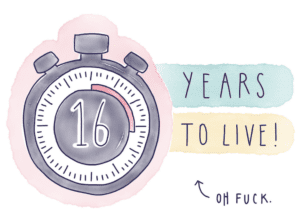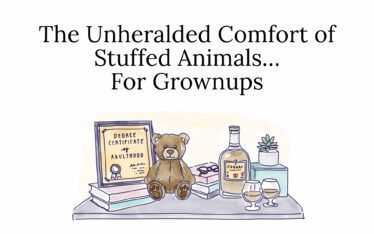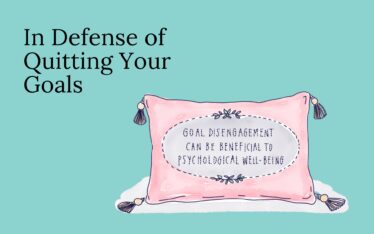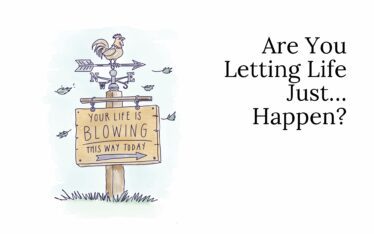How would your life be different if you knew the exact date and time you were going to die?
Would you prefer to know, or would you prefer it to be like it is today—a total live-or-die crap shoot every day you wake up not dead yet?
For many of us it’s the unpredictability of death we fear most . . . that we don’t exactly know when the Reaper will show up to the party (will he crash the party early? Will he show up fashionably late?)—and some believe it’s this fact that makes us fear death, not the inevitability of it in itself. We love to be in control. I love control! So does fixing the “unpredictability problem” make you feel better behind the wheel of your life, or worse?
Let’s get on with this expiry date exercise.
 Pretend you had a crystal ball (it would probably be skull-shaped) that told you the day and time of your death: 3pm local time, exactly 16 years from today. (If you’re a little long in the tooth, you can still play this game. The oldest human made it to 122, so you’ve got this, Sparky!)
Pretend you had a crystal ball (it would probably be skull-shaped) that told you the day and time of your death: 3pm local time, exactly 16 years from today. (If you’re a little long in the tooth, you can still play this game. The oldest human made it to 122, so you’ve got this, Sparky!)
- First of all, what is that exact date?
- How old will you be on that date?
- How does knowing this date affect you?
- Would it impact the way you’d live your life between now and the date you wrote down? How?
- What sorts of things would you do? How would you spend your time?
- What would you stop doing?
The key is to pluck the gems out of how you want those last hypothetical 16 years to be. I’m guessing the ways you’d spend your time would line up with the things you value (so if you’re a big family guy, then your 16-year countdown would likely be family-focused. If you’re a nature gal, the 16-year stint in front of you might involve cruising through a lot of National Parks). So what do you value? What tidbits might you want to bring into your life today—the life you’re likely taking for granted?
Because I deal in death, I get this question a lot:
“What do you think of the ‘what would you do if you had a week left to live’ question?”
I’m not a fan.
Many of us rightfully dismiss that cliché question because we know it’s unrealistic to live a life today that resembles what we’d really do in that final fantasy week. Quitting our jobs with the help of several choice words directed at the boss, eating seven days’ worth of cupcakes and cheeseburgers (with bacon, please!), draining the bank account to fly to far-flung places—not to mention the immoral things we’re all too decent to write or read about here—none of that is particularly helpful to highlight how we might want to steer our much-more-than-a-week-left lives in a meaningful direction.
Imagining a 16-year distance-to-death timeline, well, that seems like a more reasonable thought experiment, no? It’s far enough away to not blow our savings, to maybe not quit work, to maybe not go on a 16-year bender.
Facing the truth about our mortality should ideally activate something productive, thoughtful, and generative in our lives, not trigger us to abandon all reason and loot all that we have in a mad hedonic orgy of excess. Practicing memento mori (remembering we’re going to die) is intended to sharpen our awareness of how we can live bigger lives now, to course-correct life plans that might be paving their way towards future regrets.
So should we get on with these next 16 however many years we’re lucky to get? Should we start crossing things off our bucket lists? Should we all go for those cupcakes and burgers? National Burger Day is August 24th . . . just saying.

P.S.: Let’s Instagram!
P.P.S.: Oh and just in case you missed it… I’d love you forever if you took 16 minutes out of your life to watch my TEDx talk!






